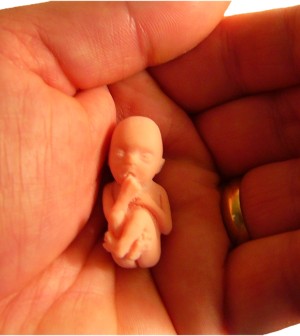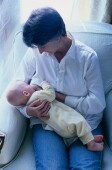- Could Your Grocery Store Meat Be Causing Recurring UTIs?
- Are You Making This Expensive Thermostat Error This Winter?
- Recognizing the Signs of Hypothyroidism
- 10 Strategies to Overcome Insomnia
- Could Artificial Sweeteners Be Aging the Brain Faster?
- Techniques for Soothing Your Nervous System
- Does the Water in Your House Smell Funny? Here’s Why
- Can a Daily Dose of Apple Cider Vinegar Actually Aid Weight Loss?
- 6 Health Beverages That Can Actually Spike Your Blood Sugar
- Treatment Options for Social Anxiety Disorder
For Breast-Feeding Moms, Tips on Eating for Two


Eating healthy foods while you’re breast-feeding will help you and your baby get the nutrients both of you need, experts say.
The U.S. Department of Health and Human Services (HHS) reminds new mothers that breast-feeding provides many health benefits for infants, including protection against infection and illness.
It advises breast-feeding mothers to eat a variety of vegetables and fruits; seafood, lean meats, poultry, eggs, beans and nuts; and low-fat or fat-free milk, or soy products with added calcium. Other recommended foods include brown rice, 100 percent whole-wheat bread and other whole grains, and fortified cereals with added iron and folic acid.
Some other breast-feeding tips from the HHS follow:
- Limit your intake of foods and drinks that are high in empty calories from added sugars and solid fats. These include desserts, fatty meats, fried foods and sugar-sweetened drinks, the agency said in a news release.
- Fish and shellfish contain nutrients that can help your infant see and learn better, so you should eat seafood two or three days a week while breast-feeding. Healthy seafood choices include: salmon, catfish, cod, herring, shrimp, canned light tuna, white (albacore) tuna, but no more than 6 ounces a week.
- Don’t eat fish that are high in mercury, which can hurt an infant’s development. Fish to avoid include swordfish, tilefish, shark and king mackerel.
- You need extra fluids, such as water and fat-free or low-fat milk, while breast-feeding. Try to drink a glass of water each time you breast-feed. Don’t drink alcohol or sweetened beverages, and avoid or limit caffeine.
Most breast-feeding women can get all the nutrients they need by eating healthy foods. If you think you’re not getting enough nutrients, talk to your doctor about taking a multivitamin, the agency added.
More information
The American Academy of Pediatrics has more about diet and breast-feeding.
Source: HealthDay
Copyright © 2026 HealthDay. All rights reserved.










